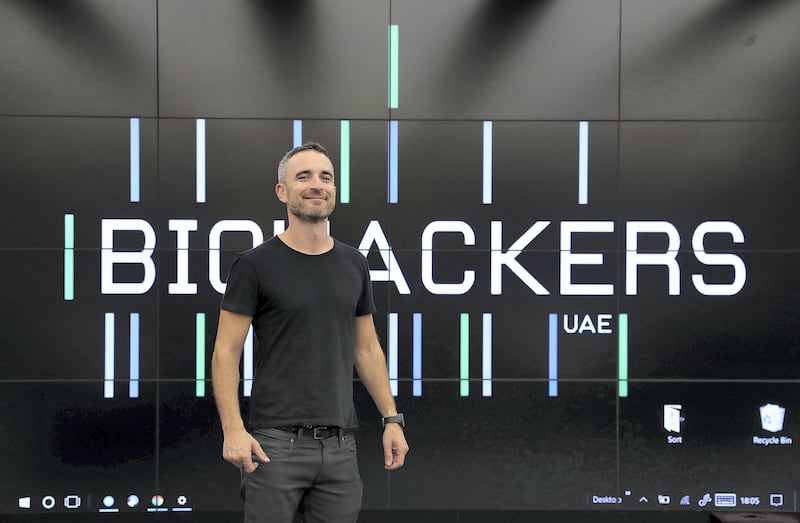Beyond yoga classes and cold-pressed juice, fish-oil supplements and the Fitbit, a small but dedicated group of UAE residents is diving deep – very, very deep – into the latest ways to maximise their minds and bodies.
There are almost 200 members of Biohackers UAE, a Facebook-based group that has held half a dozen meetings in Dubai over the past year. Dr Yasmin Kottait, a paediatric dentist, postponed her first iftar of Ramadan to attend the most recent event at Dubai Future Accelerators. Kottait, who is from Egypt, had experienced her first successful day of Ramadan thanks to a "Bulletproof suhoor", in which she woke to consume some MCT oil (main ingredient: medium chain triglycerides, popularised by Dave Asprey's The Bulletproof Diet), almond milk and a tiny bit of coffee, before going back to sleep. "I wanted to hack my fasting," she says.
The events are organised by Alex Azzi, founder of the online supplement shop Biohack.ae. Azzi's model is to rely on those in the industry who are touting the hacks – individuals such as Bulletproof's Asprey and Tim Ferriss, the American author of the 4-Hour book series – to be obsessive and brand-protective enough to recommend and share only the most effective innovations and methods.
Azzi's got his eye on the latest version of the Oura, a smart ring sleep tracker and heart rate monitor in one, and he's already bought and regularly uses Muse, an EEG-based brainwave reader. "I credit it with helping me meditate more in the past six months than in the last 36 years of my life," says Azzi. "Meditation is commonly agreed to be one of the most important things you can do with your life."
Biohacking doesn’t come cheap: the Muse and Oura retail for more than Dh1,000 each. But it doesn’t cost anything to take a cold shower every day, another of Azzi’s passions. “That’s my favourite easy hack lately,” he says. “If you take the conscious decision of ‘I’m going to turn the knob until I’m uncomfortable and put myself through that kind of feeling’, and make that conscious choice, you exercise your willpower.” To follow? It could be ice baths, which Azzi deems “next level”.
"I completely agree," Kottait says. "There are some spa therapies where they encourage you to go into hot water, then the sauna, then cold, cold baths, freezing cold, immerse yourself, and stay, and then you feel the release and your cells are different."
It was a first meeting for Oguzhan Arslan, a Turkish filmmaker, who admitted a full schedule at work had temporarily put him off his biohacking game. “I have to be honest, in the past three months there hasn’t been much of a routine,” he told Azzi. “The Bulletproof coffee when I really need to grind.”
Roman Matiushchenko, from Ukraine, popped by to promote his company’s futuristic-looking Bodyo Health Pod, a gadget that monitors blood pressure, blood sugar, height, weight, fat mass, muscle mass, bone density and hydration.
Jason Moore, meanwhile, the American president of Lanjaron Arabia, a natural mineral water brand from Spain, was invited to speak about the difference between his product and local bottled drinking water. “Water does a magical job of distributing minerals to your trillions of cells, to the right place at the right time,” he says. “Does highly processed water [provide the same] hydration? I have a lot of examples of where maybe it doesn’t,” says Moore.
The question struck a chord with Jarek Nesterowicz, a longevity coach who moved to Dubai from Poland. “The thing I noticed when I moved to Dubai was the water,” he says. “I felt terrible.” As his diet, lifestyle and sleep were optimal, Nesterowicz turned to the internet, where he started to suspect a lack of minerals could be causing his malaise – and contributing to the poor condition of the varicose veins in his legs, a telltale sign that his body’s functionality was suffering. It took a stretch of drinking three bottles of San Pellegrino per day, at great expense, to feel better. “I tried for a week to recover myself,” he explains.
The water portion of the discussion morphed into Azzi showing a short clip of Gerald H Pollack, a professor of bioengineering at the University of Washington and author of The Fourth Phase of Water: Beyond Solid, Liquid and Vapour. Pollack's theories about a gel-like "exclusion zone" for water, one that is entirely different from the commonly accepted H2O, might seem a bit out there.
However, as Azzi reasons, when you spend your life studying something, you probably know what you are talking about. Also, unlike mainstream medicine, when it comes to biohacking, the placebo effect is a good thing. “Be as sceptical as you want,” Azzi says, with a smile, “but whatever you believe works, will definitely work.”
__________________
Read more:
The best ways to maintain exercise routines during Ramadan
Staying healthy during Ramadan: what to eat and what to avoid
Fasting in Ramadan: 'Don't break your fast with salty processed food'
__________________











